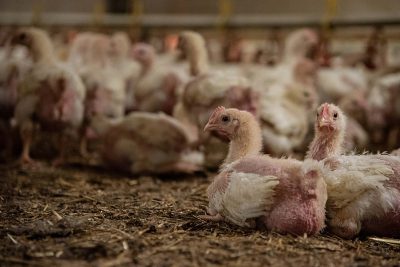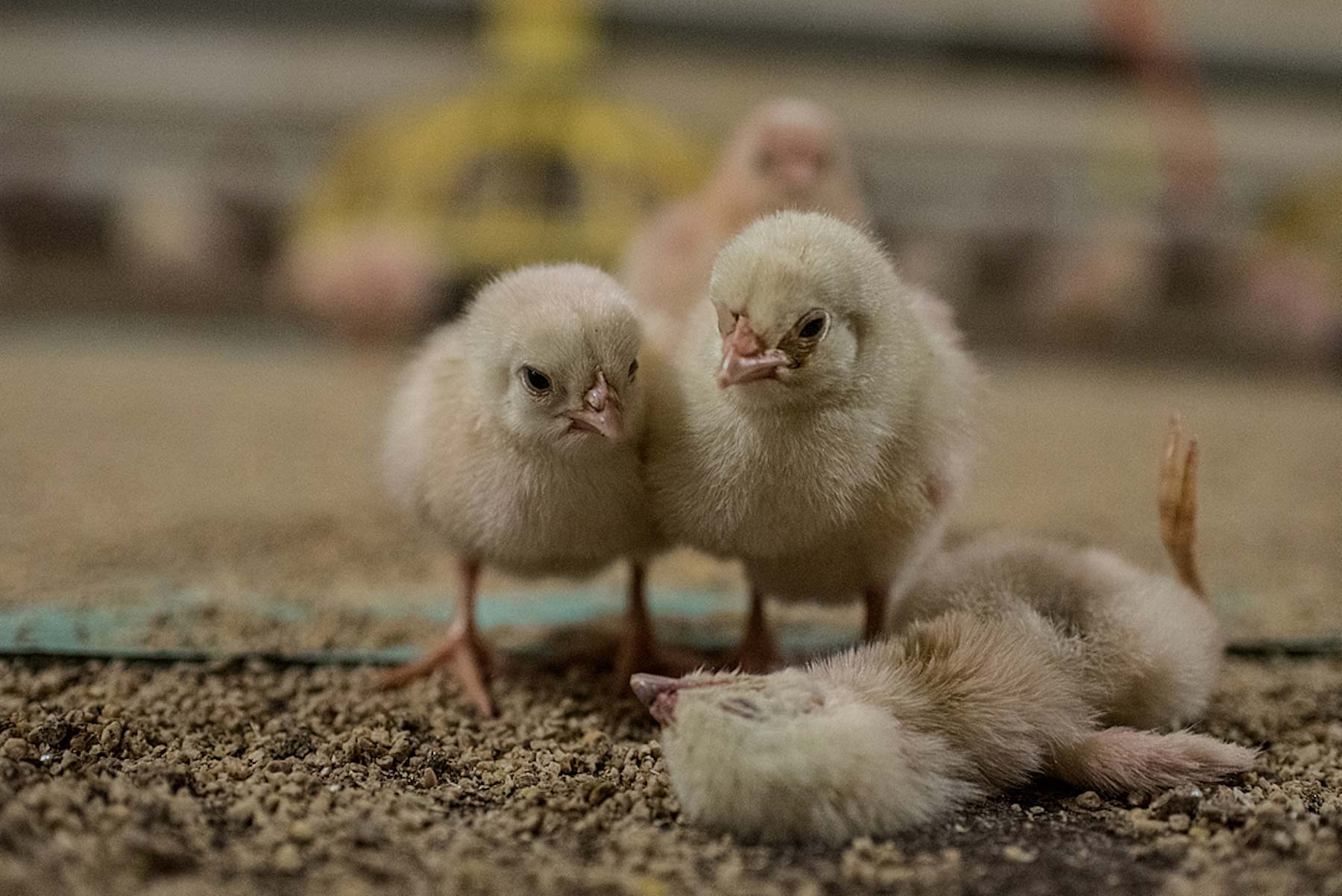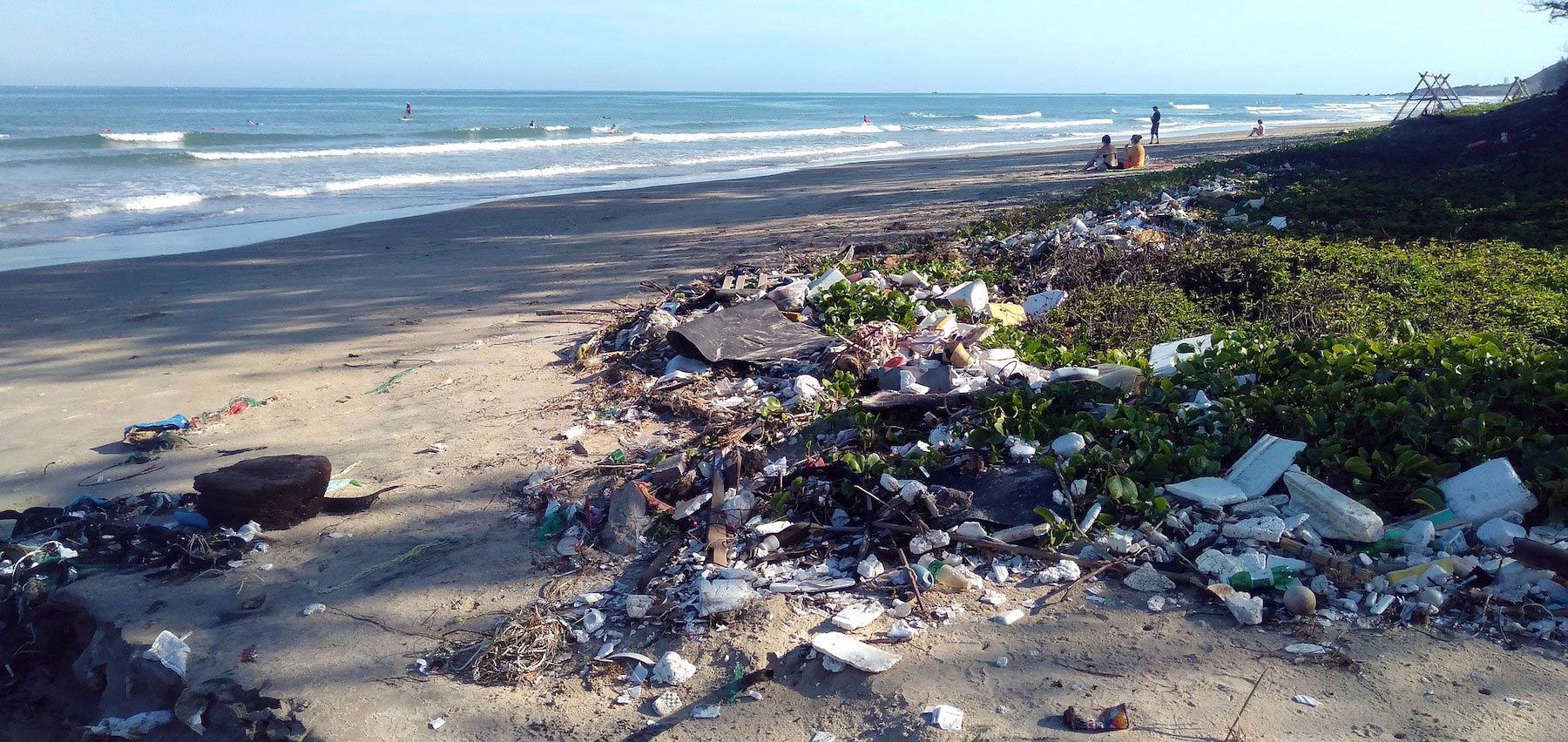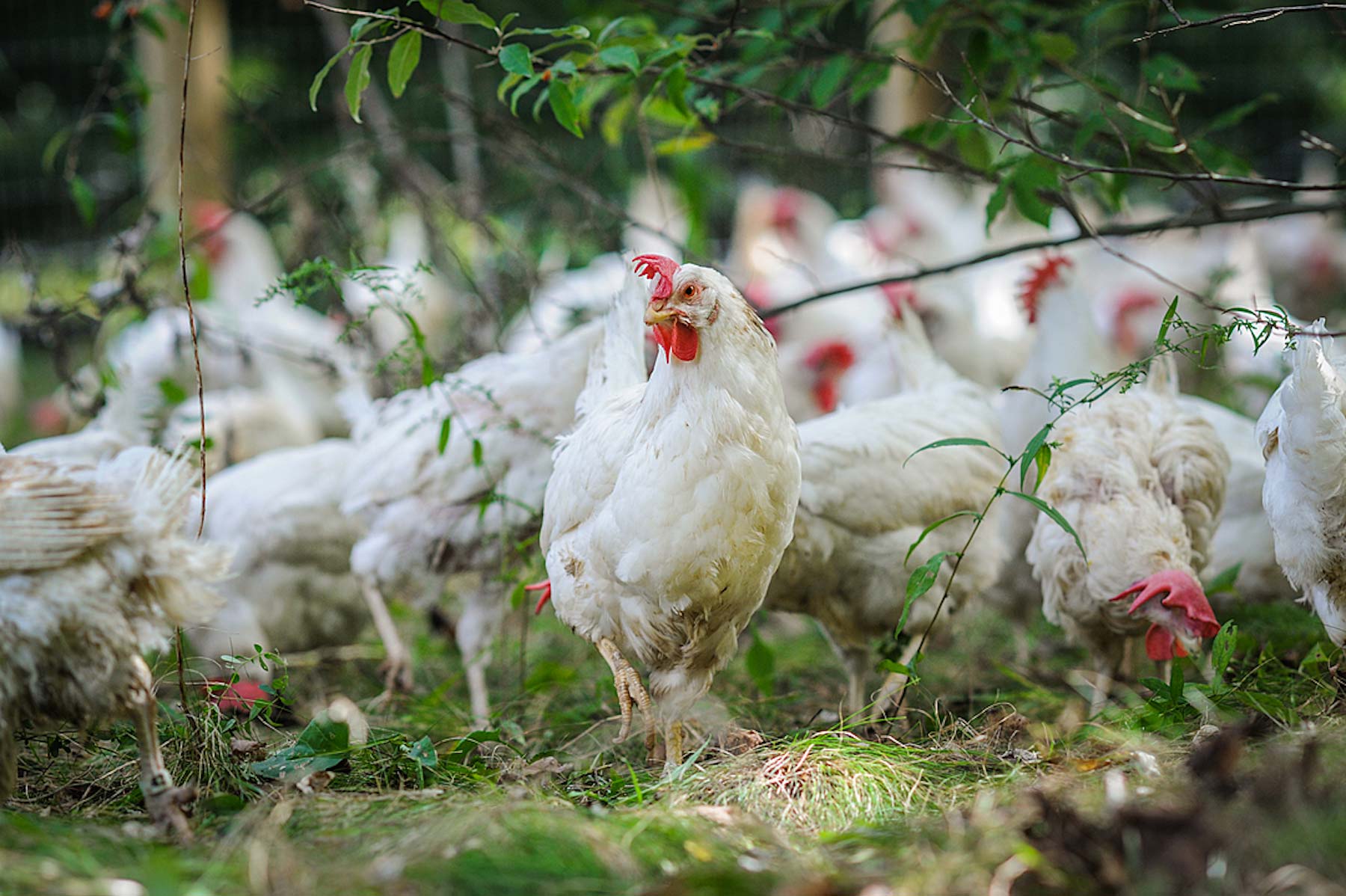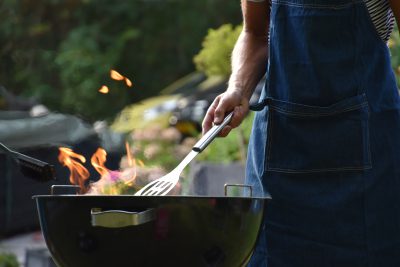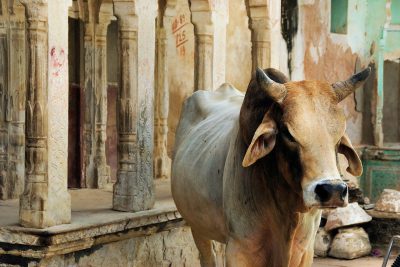Estimated reading time: 7½ minutes
Cheap meat is a problem. It can only be produced through factory farming which has disastrous consequences for animals and the planet, and contributes to many serious health problems in people, too. Almost all chicken in the United States is factory farmed, including Costco’s.
What Is Costco Chicken?
Costco’s chicken is the carcass of a whole bird who has been cooked on a rotisserie. The meat is injected with a saline solution to make it extra salty, a flavor people crave. This, plus the fact it is so cheap, has seen this particular meat soar in popularity. In fact, the company sells almost 100 million birds a year.
Where Does Costco Chicken Come From?
More than 99 percent of chickens raised for their flesh in the United States were raised on a factory farm. These are highly intensive, mechanised places – much more of a ‘factory’ than a ‘farm’ – where animals are mass produced, treated as commodities, and denied everything that makes life worthwhile for them.
How Are Costco Chickens Raised?
Tens of thousands of birds are kept together inside each vast factory farm shed. They never get to go outside, breathe fresh air, scratch in the earth, roam, or dust bathe. They don’t get to form flocks, build nests or rear their young. Inside the sheds, there is nothing for them to do, no room for their natural behaviors. They just sit in their own waste and eat. The birds have been genetically selected to put on weight fast, and such rapid weight gain can cause their hearts to fail and legs to break. Millions of birds die every year right there in the sheds, uncared for and untreated. Those who do survive six weeks are sent to slaughter. It’s a pitiless system.
Why Is Costco Chicken So Cheap?
The reason it is so cheap is that the meat is sold at a loss. This is done on purpose as the company knows that cut-price meat brings people to the store and those people will inevitably buy other products.
Chickens Are Placed In Strategic Places
It’s surprisingly hard to avoid buying other products in Costco, even if people entered intending to buy only the meat. The chicken is always positioned quite deliberately at the back of the store, forcing people to pass many more products that they then cannot resist. Shoppers may not realise the corporate influence they are subjected to at Costco but the company sure does.
What’s Wrong With Costco Chicken?
Where do we begin?
They’re Processed Foods
All processed meat causes cancer, and cooking meat at high temperatures can also produce carcinogenic chemicals, including heterocyclic aromatic amines (HAAs) and polycyclic aromatic hydrocarbons (PAHs). Rotisserie chicken is therefore a double whammy of risk. Replacing meat with plant foods cuts this risk, while also adding fiber and antioxidants to the diet that protect us against cancer.
If you’re finding it hard to resist rotisserie chicken, check out Bryn’s story. He ditched his favorite food after suffering two heart attacks and turned his life around by eating plant-based.
Costco Chicken Operation In Nebraska
Just a handful of companies own the majority of chicken farms in the United States, and they often sell the birds’ carcasses for cuts of meat to get the best price. This left a shortage of whole dead birds. In an effort to keep supply up and costs down, Costco set up its own $450 million complex in Nebraska. On the site is a feed mill, a hatchery (on farms, chicks are not even hatched by their mothers) and slaughter facilities.
Such a huge site raises both environmental and health concerns, including water contamination from runoff and respiratory-induced conditions from the ammonia and other pollutants, as well as the inherent pandemic risks of intensive farming.
Local activist Randy Ruppert says: “They are bringing degenerative farming to Nebraska, nothing else.”
Contract Concerns
Intensive farming is not only bad news for animals and the environment; it’s bad news for people, too. Those who work in farming and slaughter face risks of injury, are exposed to pollutants that can damage their health, and may also suffer with their mental health. They are low-paid and often treated poorly.
In Nebraska, there are real concerns that the Costco contracts require the farmers to take all the financial risks while the company reaps the profits. Says Robert Taylor, a professor emeritus of agricultural economics at Auburn University: “This particular form of contract agriculture essentially makes the farmer an indentured servant. The farmer is basically reduced to a chicken house janitor.”
Growth And Weight Control
Chickens suffer. They are deliberately bred to put on weight fast, about six times faster than chickens in 1925. Such rapid weight gain means the birds reach slaughter weight in just six weeks, which makes for a fast turnaround. But this monstrous weight gain comes at a price – lameness, broken bones, heart attacks, birds splayed out on the ground, others on their backs unable to get up. Because of these in-bred traits, even the few birds who are rescued from these appalling conditions do not live long.
Environmental Issues
Factory farming is a disaster for the environment. Soy is grown on deforested lands, including the Amazon, to be turned into feed for factory farmed chickens, turkeys, pigs and fish all over the world. It is also unsustainable to waste crops by feeding them to farmed animals when we get so much less meat, eggs and milk in return. We could feed millions more people if we just grew grain for them instead.
As for Costco specifically, those clam shell plastic cases are a real problem. There is a lot of plastic in them and it is not recyclable everywhere. Plastic is a serious problem for our planet. Every year, about 8 million tons of it get into the oceans, polluting them and killing wildlife. The problem is showing no signs of stopping because we are showing no signs of changing our behavior.
Water Contamination
Factory farming forces vast numbers of chickens into small areas, which means vast amounts of urine and feces are produced, along with all the pathogens and antibiotics they contain. Says Hague Water of Maryland: “Poultry farm waste includes manure, urine, feathers, feed, and chicken carcasses. After heavy rainfall or other inclement weather, these contaminants flow into creeks, canals, and groundwater.”
They say: “As poultry farming grows, water sources are increasingly at risk, and so are the people who live around them.”
Ammonia
In 2019, a study of around 600 chicken sheds on Maryland’s Eastern Shore found they emitted an estimated 33.8 million pounds of ammonia per year, about 24.4 million pounds of which polluted land and water. Agricultural runoff is the biggest nitrogen polluter of Chesapeake Bay. Nitrogen causes algal blooms which cuts the oxygen supply and causes aquatic animals to suffocate. It can also kill life in the oceans where “dead zones” are increasing in both number and size. Factory farms all over the country and all over the world cause similar water pollution.
Workers’ Health
The ammonia, dust, microbes and other particulate matter inside chicken farms are a danger to workers’ health. They irritate the respiratory tract and are associated with conditions such as asthma, chronic bronchitis, chronic airways obstructive disease (COPD), allergic alveolitis, and organic dust toxic syndrome (ODTS).
Plus, slaughterhouse work has been linked to a variety of mental health disorders, including PTSD and PITS (perpetration-induced traumatic stress). It has also been connected to an increase in drug and alcohol abuse, as well as a rise in crime rates, including higher incidents of domestic abuse. Factory farms are really bad for people, too.
Is Costco Rotisserie Chicken Healthy?
Costco chickens reportedly contain 460mg sodium per serving, which is about one third of the daily intake recommended by The Institute of Medicine. But the real danger is in processed meat being cooked at high temperatures – remember what we said about these being carcinogenic?
It is definitely not healthy for the bird, nor the planet, and we wouldn’t recommend it as a healthy choice for people either.
Why Should You Not Buy Costco Chicken?
We’d suggest people choose plant-based alternatives to all chicken, and indeed all meat, fish, dairy and eggs. All these products have a serious negative impact on our planet, driving deforestation, pollution, biodiversity loss and climate change. And of course, they massively increase the amount of suffering in the world. The billions of chickens born into the factory farming system every year endure a miserable existence, with many suffering throughout their whole lives. We can be better. We can make better choices that are good for us, for animals and our planet.
Conclusion
One day we’ll look back on our treatment of animals with shame, and recognise that our seemingly insatiable desire for meat destroyed so much of what is beautiful in our world. The evidence is clear and it is now down to all of us who have a choice to use that privilege responsibly. We can choose animal products that are connected to some of the most serious lifestyle diseases – heart disease, type 2 diabetes, and cancers – as well as environmental degradation and unimaginable animal suffering, or we can choose healthy, nutrient-rich, compassionate and sustainable plant foods.
Ready to try a better way?
